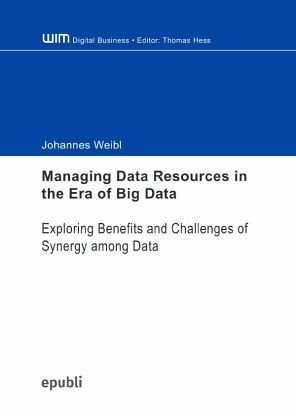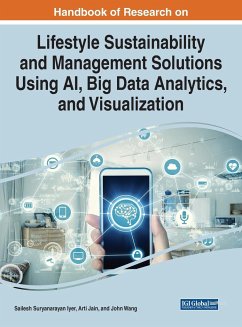
Managing Data Resources in the Era of Big Data
Versandkostenfrei!
Versandfertig in 6-10 Tagen
39,99 €
inkl. MwSt.

PAYBACK Punkte
0 °P sammeln!
In the digital age, companies use an increasing amount of digital technologies as well as long-standing business IT systems. All of these technologies and tools generate and collect a large variety of data - from their customers, employees, suppliers, partners, and competitors. Leading companies do not just passively collect and store these data sets, they actively combine and analyze them to leverage new business value.However, managing the increasing plurality of data from various source systems is a challenging task for the majority of companies. Therefore, this dissertation shows a novel a...
In the digital age, companies use an increasing amount of digital technologies as well as long-standing business IT systems. All of these technologies and tools generate and collect a large variety of data - from their customers, employees, suppliers, partners, and competitors. Leading companies do not just passively collect and store these data sets, they actively combine and analyze them to leverage new business value.
However, managing the increasing plurality of data from various source systems is a challenging task for the majority of companies. Therefore, this dissertation shows a novel and comprehensive approach to managing the variety of data from a managerial and conceptual perspective by means of four qualitative-empirical studies.
From a theoretical view, this dissertation provides an in-depth understanding and discussion of the concept of synergy, both in general and in a data context. Practitioners find crucial managerial challenges that need management attention, and possible solutions as well as a concrete managerial guideline of how collecting and synthesizing data leverages new insights, efficiency gains and innovative data-driven products and services in companies.
However, managing the increasing plurality of data from various source systems is a challenging task for the majority of companies. Therefore, this dissertation shows a novel and comprehensive approach to managing the variety of data from a managerial and conceptual perspective by means of four qualitative-empirical studies.
From a theoretical view, this dissertation provides an in-depth understanding and discussion of the concept of synergy, both in general and in a data context. Practitioners find crucial managerial challenges that need management attention, and possible solutions as well as a concrete managerial guideline of how collecting and synthesizing data leverages new insights, efficiency gains and innovative data-driven products and services in companies.












